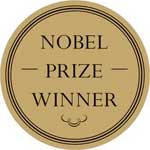Trio win Nobel for taking chemistry to cyberspace

Martin Karplus, a US-Austrian citizen, Michael Levitt, a US-British citizen, and Arieh Warshel of the US and Israel were honoured on Wednesday (10 October) for the development of multi-scale models for complex chemical systems, the Nobel jury said.
The three were being recognised for taking the experiment to cyberspace, it added.
"Chemists all over the world simulate complex experiments on their computers thanks to work by the trio that dates back to the 1970s," the Royal Swedish Academy of Sciences said in a statement.
"I was doing work before my post doctorate when I was 20 years old to write a computer program. I guess I wrote a pretty good program," Levitt, now 66, told AFP by telephone from his California home.
He said that it was essentially this program that lay at the core of the Nobel award, adding that people still benefitted from it today.
"I was speaking to a doctoral student and he was able to do a calculation that used to take two hours and now takes a 100th of a second," Levitt said. "It makes a huge difference!"
The Nobel jury said the tool is universal, helping pharmaceutical engineers to design new drugs or engineers to make cleaner energy sources or smarter manufactured products.
Classical and quantum physics
The three combined classical physics with quantum physics - two previously rival worlds - in computer models designed to predict chemical reactions.
Such reactions can take place, for instance, between industrial chemicals or in biological functions, when an enzyme cuts a protein, a virus penetrates a cell or or a cell divides.
The processes can happen in a fraction of a millisecond, defeating conventional algorithms that try to map them step-by-step.
By including quantum physics in the computational mix, the number of permutations for calculation rises hugely, as they incorporate the possibility that an atom is in one of several of the famously fickle quantum states at any time in the processes.
This also requires enormous computing power to crunch the data.
"The computer models that have been developed by the Nobel laureates in chemistry 2013 are powerful tools," the academy observed.
"Exactly how far they can advance our knowledge is for the future to decide," it added.
"Today the computer is as important as the test tube as a tool for chemists," it said.
Karplus, 83, works at the University of Strasbourg in eastern France and Harvard University; Levitt at Stanford University; and Warshel, 72, at the University of Southern California.
The Academy of Sciences said Levitt has described his dream of simulating a living organism on a molecular level as a "tantalising thought."
The trio will share the prize of eight million Swedish kronor (US$1.25m). The prize - reduced from from the 10 million kronor since 2001 - was because of the economic crisis facing Europe.
In line with tradition, the laureates will receive their prize at a formal ceremony in Stockholm on 10 December, the anniversary of prize's founder Alfred Nobel's death in 1896.
Last year, the honour went to Robert Lefkowitz and Brian Kobilka of the United States for identifying a class of cell receptor, yielding vital insights into how the body functions on the molecular scale.
Source: AFP via I-Net Bridge
Source: I-Net Bridge

For more than two decades, I-Net Bridge has been one of South Africa’s preferred electronic providers of innovative solutions, data of the highest calibre, reliable platforms and excellent supporting systems. Our products include workstations, web applications and data feeds packaged with in-depth news and powerful analytical tools empowering clients to make meaningful decisions.
We pride ourselves on our wide variety of in-house skills, encompassing multiple platforms and applications. These skills enable us to not only function as a first class facility, but also design, implement and support all our client needs at a level that confirms I-Net Bridge a leader in its field.
Go to: http://www.inet.co.za









